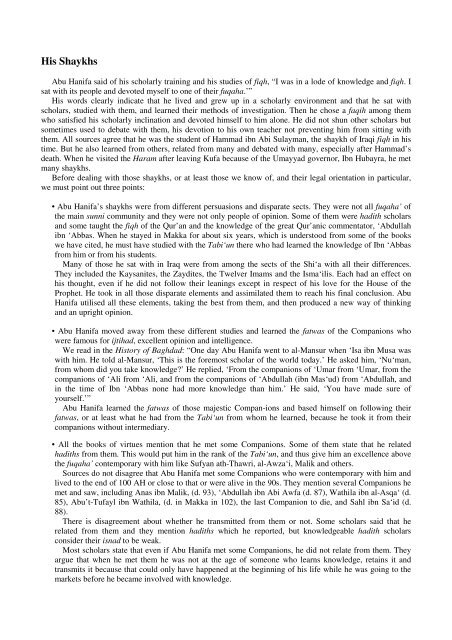You also want an ePaper? Increase the reach of your titles
YUMPU automatically turns print PDFs into web optimized ePapers that Google loves.
<strong>His</strong> Shaykhs<br />
<strong>Abu</strong> <strong>Hanifa</strong> said of his scholarly training <strong>and</strong> his studies of fiqh, “I was in a lode of knowledge <strong>and</strong> fiqh. I<br />
sat with its people <strong>and</strong> devoted myself to one of their fuqaha.’”<br />
<strong>His</strong> words clearly indicate that he lived <strong>and</strong> grew up in a scholarly environment <strong>and</strong> that he sat with<br />
scholars, studied with them, <strong>and</strong> learned their methods of investigation. Then he chose a faqih among them<br />
who satisfied his scholarly inclination <strong>and</strong> devoted himself to him alone. He did not shun other scholars but<br />
sometimes used to debate with them, his devotion to his own teacher not preventing him from sitting with<br />
them. All sources agree that he was the student of Hammad ibn Abi Sulayman, the shaykh of Iraqi fiqh in his<br />
time. But he also learned from others, related from many <strong>and</strong> debated with many, especially after Hammad’s<br />
death. When he visited the Haram after leaving Kufa because of the Umayyad governor, Ibn Hubayra, he met<br />
many shaykhs.<br />
Before dealing with those shaykhs, or at least those we know of, <strong>and</strong> their legal orientation in particular,<br />
we must point out three points:<br />
• <strong>Abu</strong> <strong>Hanifa</strong>’s shaykhs were from different persuasions <strong>and</strong> disparate sects. They were not all fuqaha’ of<br />
the main sunni community <strong>and</strong> they were not only people of opinion. Some of them were hadith scholars<br />
<strong>and</strong> some taught the fiqh of the Qur’an <strong>and</strong> the knowledge of the great Qur’anic commentator, ‘Abdullah<br />
ibn ‘Abbas. When he stayed in Makka for about six years, which is understood from some of the books<br />
we have cited, he must have studied with the Tabi‘un there who had learned the knowledge of Ibn ‘Abbas<br />
from him or from his students.<br />
Many of those he sat with in Iraq were from among the sects of the Shi‘a with all their differences.<br />
They included the Kaysanites, the Zaydites, the Twelver <strong>Imam</strong>s <strong>and</strong> the Isma‘ilis. Each had an effect on<br />
his thought, even if he did not follow their leanings except in respect of his love for the House of the<br />
Prophet. He took in all those disparate elements <strong>and</strong> assimilated them to reach his final conclusion. <strong>Abu</strong><br />
<strong>Hanifa</strong> utilised all these elements, taking the best from them, <strong>and</strong> then produced a new way of thinking<br />
<strong>and</strong> an upright opinion.<br />
• <strong>Abu</strong> <strong>Hanifa</strong> moved away from these different studies <strong>and</strong> learned the fatwas of the Companions who<br />
were famous for ijtihad, excellent opinion <strong>and</strong> intelligence.<br />
We read in the <strong>His</strong>tory of Baghdad: “One day <strong>Abu</strong> <strong>Hanifa</strong> went to al-Mansur when ‘Isa ibn Musa was<br />
with him. He told al-Mansur, ‘This is the foremost scholar of the world today.’ He asked him, ‘Nu‘man,<br />
from whom did you take knowledge?’ He replied, ‘From the companions of ‘Umar from ‘Umar, from the<br />
companions of ‘Ali from ‘Ali, <strong>and</strong> from the companions of ‘Abdullah (ibn Mas‘ud) from ‘Abdullah, <strong>and</strong><br />
in the time of Ibn ‘Abbas none had more knowledge than him.’ He said, ‘You have made sure of<br />
yourself.’”<br />
<strong>Abu</strong> <strong>Hanifa</strong> learned the fatwas of those majestic Compan-ions <strong>and</strong> based himself on following their<br />
fatwas, or at least what he had from the Tabi‘un from whom he learned, because he took it from their<br />
companions without intermediary.<br />
• All the books of virtues mention that he met some Companions. Some of them state that he related<br />
hadiths from them. This would put him in the rank of the Tabi‘un, <strong>and</strong> thus give him an excellence above<br />
the fuqaha’ contemporary with him like Sufyan ath-Thawri, al-Awza‘i, Malik <strong>and</strong> others.<br />
Sources do not disagree that <strong>Abu</strong> <strong>Hanifa</strong> met some Companions who were contemporary with him <strong>and</strong><br />
lived to the end of 100 AH or close to that or were alive in the 90s. They mention several Companions he<br />
met <strong>and</strong> saw, including Anas ibn Malik, (d. 93), ‘Abdullah ibn Abi Awfa (d. 87), Wathila ibn al-Asqa‘ (d.<br />
85), <strong>Abu</strong>’t-Tufayl ibn Wathila, (d. in Makka in 102), the last Companion to die, <strong>and</strong> Sahl ibn Sa‘id (d.<br />
88).<br />
There is disagreement about whether he transmitted from them or not. Some scholars said that he<br />
related from them <strong>and</strong> they mention hadiths which he reported, but knowledgeable hadith scholars<br />
consider their isnad to be weak.<br />
Most scholars state that even if <strong>Abu</strong> <strong>Hanifa</strong> met some Companions, he did not relate from them. They<br />
argue that when he met them he was not at the age of someone who learns knowledge, retains it <strong>and</strong><br />
transmits it because that could only have happened at the beginning of his life while he was going to the<br />
markets before he became involved with knowledge.














